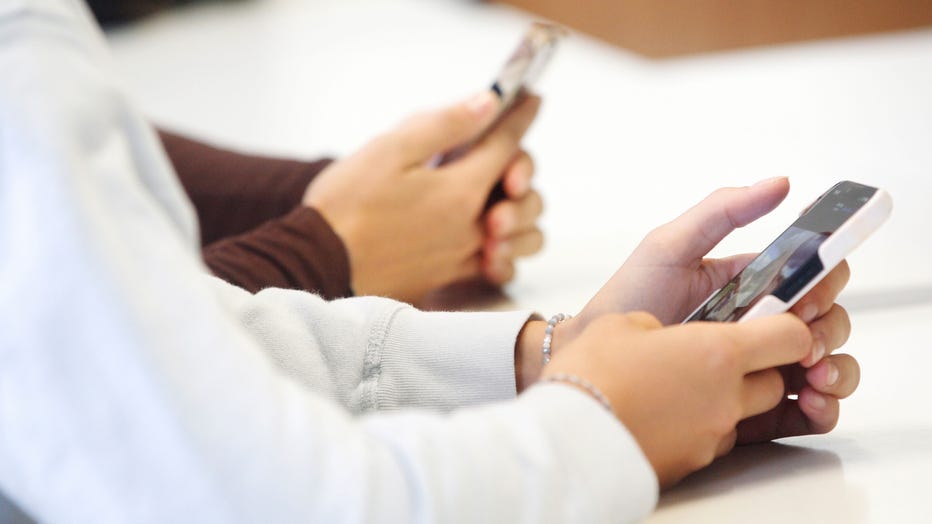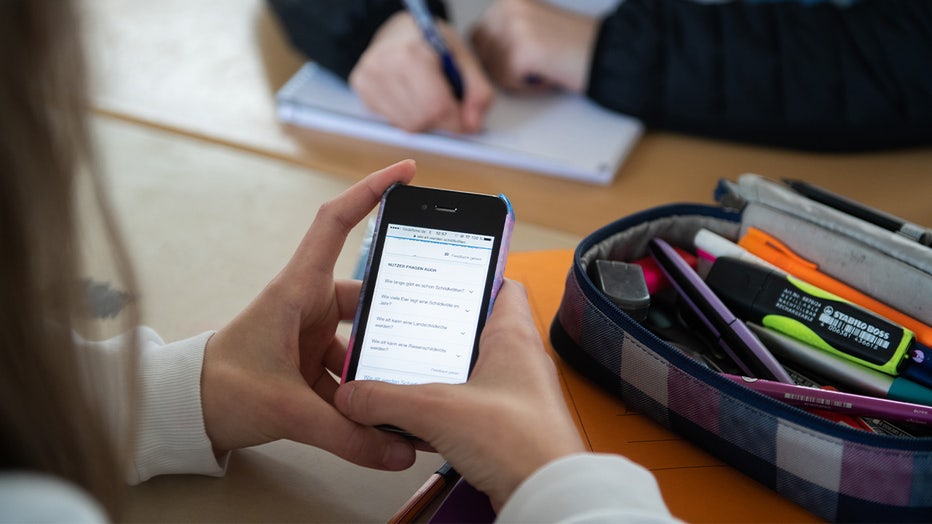Could New York City ban cell phones from classrooms?
Could NYC ban cell phones from classrooms?
The Los Angeles Unified School District, the nation's second largest school district, has voted to ban cell phones in classrooms. But does this mean the nation's largest school district, New York City, could be next? FOX 5 NY's Sharon Crowley takes a look.
NEW YORK CITY - Could New York City ban cell phones from classrooms this school year?
NYC officials say cell phone use in school has become a distraction and outright addiction.
Note: Students who bring a cell phone to school must use it only in accordance with their school’s cell phone policy.

FILE - Students use their cell phones in class. (Photo by Roland Weihrauch via Getty Images)
According to NYC 311, students are currently allowed to bring their cell phones, computing devices, portable music, and entertainment systems to school. However, there is no official cell phone ban in place at New York City schools.
NYC Schools Chancellor David Banks said the ban could come into effect as early as January 2025.
RELATED: NJ school district prohibits all wireless devices: New policy explained
This comes after Los Angeles voted to ban cellphones and social media use by students during school hours in June.
NYC Schools Chancellor on cell phone bans
Now, the largest district in the nation plans to follow suit by rolling out a plan to stop phone use in school.
"They're not just a distraction. Kids are fully addicted now to phones," NYC Schools Chancellor David Banks said on Good Day New York. "We're going to ban the use of phones in schools…"
NYC proposal to ban smartphones in school
"Phones have become a major distraction to kids," Chancellor Banks talks to Good Day about the new proposal.
Banks says he's talked to hundreds of principals across the city who say "take the phones."
Could cell phones be banned in NYC schools?
Back to school: Setting social media boundaries
It's back to school season, and now's the time to set new guidelines for social media. Head of Global Policy Programs at Instagram, Dayna Geldwert, joined Good Day New York with advice for parents.
Long story short, there isn't a cell phone ban in schools just yet.
Nearly two decades ago, former NYC Mayor Mike Bloomberg implemented one of the nation's toughest phone bans that was later reversed by former NYC Mayor Bill de Blasio in 2014.
In a New York Post op-ed, Bloomberg says New York City should bring back his ban on mobile-phone use by students during school days.
Note: Every school has its own cell phone policy.
"The ban was one of many policy changes that allowed us to transform the school system in ways that dramatically raised student-achievement levels," Bloomberg writes.
He says his administration did it "despite the storm of protests it generated," and that Mayor Adams should do the same.
Parents and caregivers, though, say they fear losing touch with their kids during emergencies such as a school shooting.
NY social media ban
Hochul signs bill to limit youth social media use
New York Govenror Kathy Hochul on Thursday signed a bill that would allow parents to block their children from getting social media posts suggested by a platform's algorithm, a move to limit feeds critics argue are addictive.
In June, New York Governor Kathy Hochul signed a bill to combat social media addiction in children by allowing parents to regulate their children's algorithms.
Now, Hochul is also exploring the idea of banning cellphones in schools.
Hochul hasn't been clear on whether she would ban phones entirely, but says she would consider a flip phone that only allows students to text.
The move came amid concern over social media addiction in children.
Based on content the legislation describes as "addictive", the bill would:
- Stop platforms from showing suggested posts (considered "addictive") to people under the age of 18
- Block platforms from sending notifications about suggested posts to minors between midnight and 6 a.m. without parental consent
- Only show posts from accounts they (children) follow
Under the bill, minors could still see suggested posts if they have what the bill defines as "verifiable parental consent."
How can teachers get students to put the phone down?

ILLUSTRATION - A fifth grade student of a grammar school uses the search function of her smartphone. Photo: Daniel Reinhardt/dpa (Photo by Daniel Reinhardt/picture alliance via Getty Images)
Educators say their tried and true lesson plans are no longer enough to keep students engaged at a time of struggling mental health, shortened attention spans, reduced attendance and worsening academic performance. At the crux of these challenges? Addiction to cell phones. Now, adults are trying new strategies to reverse the malaise.
Here are some ways teachers can help students look away from their cell phones:
- Lock them up: Cell phone pouches, lockers and bins have grown in popularity to help enforce device bans.
- Do something (else): Some schools are locking up smartwatches and wireless headphones, too. But the pouches don’t work once the final bell rings. Students can create clubs around interests like board games and knitting or partake in neighborhood basketball leagues.
- Get outside: Thirteen middle schools in Maine adopted a similar approach, bringing students outdoors for 35,000 total hours during a chosen week in May. Teachers adapted their lessons to be taught outdoors, and students bonded in the open air during lunch and recess.
- Plea to parents: Parents must also make changes to their family’s cell phone culture, some teachers say.
- Fears of being canceled: Some say other forces behind teen disengagement are only amplified by the cell phone. The divisive political climate often makes students unwilling to participate in class, when anything they say can rocket around the school in a messaging app.
The Associated Press contributed to this report.

